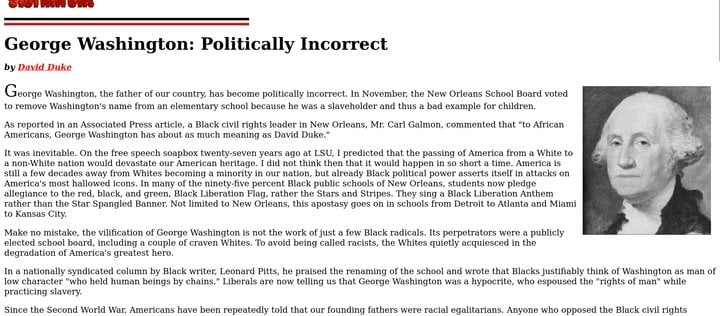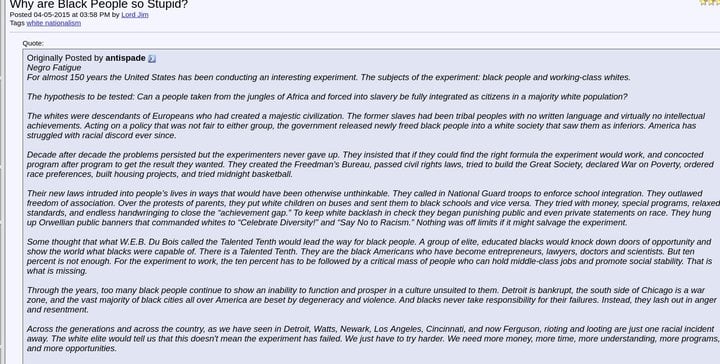Demaris Education #2
Julius Evola's *'Civilta' americana*, originally published in 1945, has been reprinted in Rome by a foundation established in his memory. The new edition is introduced by a preface, of which an English translation appears in the British periodical, *Scorpion*, from which I quote the following extracts: "Anyone today who considers American society is struck by the impression of a society gone mad, in which the germs of disintegration which Evola pointed to have multiplied and the disease has broken out visibly, defacing a social fabric which was already deteriorating. According to official statistics, more than one-fifth of the population of the United States has been involved with drugs. Organised delinquent hooliganism is still on the increase and has come to dominate large areas of some cities; every kind of sexual aberration is being advocated along with an unbridled sexual grossness; there is increasing violence and sadism in the cities, particularly among the young; pseudo- religious sects proliferate, dragging their disciples into a psychological slum world. These phenomena are only the most obviously disquieting symptoms of an accelerating decline towards total disintegration of the human personality... American society, in fact, is on an irreversible course of extinction."
"What in Europe exist in diluted form are magnified and concentrated in the United State whereby they are revealed as the symptoms of disintegration and cultural and human regression. The American mentality can only be interpreted as an example of regression, which shows itself in the mental atrophy towards all higher interests and incomprehension of higher sensibility. The American mind has limited horizons, one confined to everything which is immediate and simplistic, with the inevitable consequence that everything is made banal, basic, and levelled down until it is deprived of all spiritual life...
"The 'primitive' American mind can only superficially be compared to a 'young' mind. The American mind is a feature of the regressive society to which I have already referred. A most significant aspect of American mentality and its lack of refinement is the closeness of the American way of thinking in general to the negroid way of thinking in particular, not only in well-known examples, such as music, but in multifarious aspects of the mass psyche and in the proliferation of superstitions and religious sects of every kind, which thrive in the United States as they do in few other countries."
Evola saw the dominant principle of American society in the frantic striving for equality, which, of course, can only be equality in degradation. This, as I have remarked more than once, is simply a recrudescence of proletarian baseness that is implicit in the gospels of the "New Testament"" and is made explicit in a Christian Apocalypse in which Jesus promises that after he has returned to raise Hell on earth and has tortured and butchered the civilized population, his pets will pop out of their graves, miraculously transformed into the beings of the same age, the same sex, the same stature, and as indistinguishable from one another as the bees in a swarm.
The writer of the new preface draws an analogy to the Aryan civilization of India, slurring over the basic racial distinction involved: He writes:
"The Americans' 'open-mindedness,' which is sometimes cited in their favor, is the other side of their 'inner formlessness.' The same goes for their 'individualism.' Individualism and personality are not the same: the one belongs to the formless world of quantity, the other to the world of quality and hierarchy.... The American 'mind,' puerile and primitive, lacks characteristic form and is therefore open to every kind of standardisation.
"In a superior civilisation, as, for example, that of the Indo-Aryans, the being who is without characteristic form or caste (in the original meaning of that word), (1) not even that of servant or shudra, would emerge as a pariah. In this respect America is a society of pariahs. There is a role for pariahs. It is to be subjected to beings whose form and internal laws are precisely defined. Instead, the modern pariahs seek to become dominant themselves and to exercise their dominion over all the world."
(1. "*Caste*" is an Anglicization of the Portuguese *casta*, "pure (race)," which was used to translate the Sanskrit *varna*, "color, complexion." Strictly speaking, there are only four castes, but the word is also applied to the innumerable subdivisions of them, which are said to be the result of miscegenation. According to one theory, there are four castes because the holy men cleverly created a caste for themselves (*Brahmanas*) to put themselves on top, and originally there were only three castes, corresponding to the three strata of society in the Norse myth of Heimdahl. These were the white Aryan conquerors, the white but 'olive-skinned' descendants of the people whose civilization left the ruins in the Indus Valley, and the black aborigines.)
Since the Second World War, Americans have been repeatedly told that our founding fathers were racial egalitarians. Anyone who opposed the Black civil rights movement were represented as un-American. Of course, it was all a big lie. Washington and Jefferson, as well as the other founding fathers were not hypocrites, they were completely consistent. The truth is that when Washington and Jefferson spoke about the "rights of man" they clearly were speaking about White men, not Blacks whom they viewed as a primitive form of humanity. Thomas Jefferson in his Notes on the State of Virginia wrote that White women who cohabited with Black males should be "outside the protection of the laws," meaning that he believed that those who acted violently against them should not be prosecuted. The Constitution equated Blacks as three-fifths of a person. Even the Supreme Court of the United States dared to state clearly in a major decision that America was created "by and for White people." Racial integration, Black voting, and racial intermarriage were opposed by most Whites until late in this century.
I oppose slavery for the same reasons espoused by General Robert E. Lee. He described slavery as a despoiler of both slave and master. He believed its greatest evil was not perpetrated against Blacks, for he felt that they found a considerable advantage in American rather than African slavery. To Lee, the real damage was being done to White society. Lee was, of course, correct. The importation of millions of Blacks into America has had tragic consequences. Racially aware Whites today oppose the institution just as vehemently as racial egalitarians.
Slavery had a pernicious impact on White people in America, corrupting those classes who owned slaves and harming those Whites who did not. Whites who owned no slaves, almost eighty percent of the South's population, had the value of their labor diminished. Family farmers found it difficult to compete in agricultural markets with the cheap labor provided by slaves on the plantations. Even in many semi-skilled professions, it became difficult for independent White craftsmen to earn a decent wage competing against inexpensive slave labor.
Today, it is easy to see the destructive role of slavery, but those who condemn the founding fathers have no real understanding of history. Slavery was a socially accepted institution for ninety-nine percent of the history of mankind. In many cultures, from the most primitive ones in darkest Africa, to the enlightened ones of Greece and Rome and right up to our own early American republic, families of wealth and prestige often owned slaves.
Even the most loving person who ever walked the earth, Jesus Christ, never uttered a word against slavery, an institution which was prominent all around him. At one point in the scriptures, at the request of a slaveholder, Christ heals his slave. Did Christ instruct him to free the slave? No, he just praised the slaveholder and expressed the wish that all people should have so great a faith. (Luke 7) For his tacitly accepting slavery, will the school board members who attend church also want to extirpate Jesus Christ from their sanctuaries? Will they propose to burn the New Testament because escaped slaves are told to obey their masters and that slaves must be returned to them if they escape.? (1 Peter, 1 Timothy, 2 Titus, Ephesians) The strongest admonishment of the New Testament toward slaveholders is for them simply to treat their slaves kindly.
How does Mr. Pitts reconcile the debasement of George Washington by Black historians while they eulogize African tribal leaders who murdered tens-of-thousands of Blacks, and who without compunction enslaved and sold thousands of Blacks to the slavetraders? According to the new political correctness, White leaders in history who owned slaves are moral lepers, but Black historical figures who did so are "great Black men."
Hollywood characterizes slavery in the American colonies as a suffering unique to the Black race, yet as researcher Michael Hoffman has shown, contrary to modern notions, many thousands of Whites were slaves in the early colonial life. Many more hundreds-of-thousands of Whites faced the slave-like existence of indentured servitude, where under a limited contract, many were worked to death. Their masters often sought to extract every morsel of work from them before their contract expired. One should not forget that slavery permeated the entire world and all continents. In antiquity, slavery was once the terrible price paid by most nations defeated in war. Countless millions of our White ancestors knew the lash of the slavetrader, the pain of the loss of liberty, and the ignominy of a forgotten death. Slavery was certainly not a suffering unique to the Black race.
In North America, slavery was unique only in the fact that it was the kindest expression of it on earth. American Whites treated their Black slaves far better than African Blacks treated their own Black slaves. For this are Whites to be condemned?
On Sunday, November 30 of this year, Sixty Minutes had a program that revealed to a mostly ignorant public, the fact that slavery flourished in Africa long before the White man came and that it continues to this very day. The story depicted an environment of poverty and brutality that would make colonial slavery seem benign in comparison. In Africa today a Black can be born a slave, in America, he cannot.
One illustration of the difference between Whites and Blacks on the question of slavery, is that while historically both Whites and Blacks practiced it, resistance to it has always been led by Whites. In America, Whites composed ninety-five percent of the underground railroad, while in Africa there were no known Black crusaders who rose up with moral indignation against the institution. Africa never had, nor has today, an underground railroad. The observant cannot help but notice that there is no world-wide Black crusade to free their enslaved brethren. Compare that lack of zeal to Black and liberal hysteria against Apartheid South Africa, a society where there was no slavery and the best quality of life for Blacks in all of Africa.
In many of my media appearances with Black leaders, I point out how that if they are to condemn the White race for slavery when only ten percent of the American people practiced it for a period of about two hundred years, how do they feel about their own race which practiced it in Africa from uncounted thousands of years to the present. A black child today in America has far greater chance of having an ancestral slavemaster, than does a white child.
Madison Grant, the great naturalist who had a pivotal role in the conservation efforts of early twentieth century America, grew painfully aware of the need to preserve and nurture the founding stock of our nation. He viewed such as just as vital as preserving its flora and fauna. He said that America "sold its birthright to solve a labor shortage."
While a small class of planters and slavetraders amassed great fortunes, the average Southerner suffered an economic bondage born of slavery. Ultimately, slavery drove the two regions, North and South toward the most terrible of American wars, the War Between the States; the greatest loss of life and property ever sustained by our nation. Not only did it take the grievous toll of a million lost lives, the war cost our people billions of our best genes. They were the genes of genius and honor, of self-sacrifice and bravery, of strength and beauty. Most of the causalities were too young to have passed on those precious traits to the generations ahead. The war erased many thousands of the best of our kind from our gene pool. It incurred a genetic debt that we still pay for today and perhaps will feel forever in our genetic makeup.
I oppose slavery for the same reasons espoused by General Robert E. Lee. He described slavery as a despoiler of both slave and master. He believed its greatest evil was not perpetrated against Blacks, for he felt that they found a considerable advantage in American rather than African slavery. To Lee, the real damage was being done to White society. Lee was, of course, correct. The importation of millions of Blacks into America has had tragic consequences. Racially aware Whites today oppose the institution just as vehemently as racial egalitarians.
Slavery had a pernicious impact on White people in America, corrupting those classes who owned slaves and harming those Whites who did not. Whites who owned no slaves, almost eighty percent of the South's population, had the value of their labor diminished. Family farmers found it difficult to compete in agricultural markets with the cheap labor provided by slaves on the plantations. Even in many semi-skilled professions, it became difficult for independent White craftsmen to earn a decent wage competing against inexpensive slave labor.
Today, it is easy to see the destructive role of slavery, but those who condemn the founding fathers have no real understanding of history. Slavery was a socially accepted institution for ninety-nine percent of the history of mankind. In many cultures, from the most primitive ones in darkest Africa, to the enlightened ones of Greece and Rome and right up to our own early American republic, families of wealth and prestige often owned slaves.
Even the most loving person who ever walked the earth, Jesus Christ, never uttered a word against slavery, an institution which was prominent all around him. At one point in the scriptures, at the request of a slaveholder, Christ heals his slave. Did Christ instruct him to free the slave? No, he just praised the slaveholder and expressed the wish that all people should have so great a faith. (Luke 7) For his tacitly accepting slavery, will the school board members who attend church also want to extirpate Jesus Christ from their sanctuaries? Will they propose to burn the New Testament because escaped slaves are told to obey their masters and that slaves must be returned to them if they escape.? (1 Peter, 1 Timothy, 2 Titus, Ephesians) The strongest admonishment of the New Testament toward slaveholders is for them simply to treat their slaves kindly.
How does Mr. Pitts reconcile the debasement of George Washington by Black historians while they eulogize African tribal leaders who murdered tens-of-thousands of Blacks, and who without compunction enslaved and sold thousands of Blacks to the slavetraders? According to the new political correctness, White leaders in history who owned slaves are moral lepers, but Black historical figures who did so are "great Black men."
Hollywood characterizes slavery in the American colonies as a suffering unique to the Black race, yet as researcher Michael Hoffman has shown, contrary to modern notions, many thousands of Whites were slaves in the early colonial life. Many more hundreds-of-thousands of Whites faced the slave-like existence of indentured servitude, where under a limited contract, many were worked to death. Their masters often sought to extract every morsel of work from them before their contract expired. One should not forget that slavery permeated the entire world and all continents. In antiquity, slavery was once the terrible price paid by most nations defeated in war. Countless millions of our White ancestors knew the lash of the slavetrader, the pain of the loss of liberty, and the ignominy of a forgotten death. Slavery was certainly not a suffering unique to the Black race.
In North America, slavery was unique only in the fact that it was the kindest expression of it on earth. American Whites treated their Black slaves far better than African Blacks treated their own Black slaves. For this are Whites to be condemned?
On Sunday, November 30 of this year, Sixty Minutes had a program that revealed to a mostly ignorant public, the fact that slavery flourished in Africa long before the White man came and that it continues to this very day. The story depicted an environment of poverty and brutality that would make colonial slavery seem benign in comparison. In Africa today a Black can be born a slave, in America, he cannot.
One illustration of the difference between Whites and Blacks on the question of slavery, is that while historically both Whites and Blacks practiced it, resistance to it has always been led by Whites. In America, Whites composed ninety-five percent of the underground railroad, while in Africa there were no known Black crusaders who rose up with moral indignation against the institution. Africa never had, nor has today, an underground railroad. The observant cannot help but notice that there is no world-wide Black crusade to free their enslaved brethren. Compare that lack of zeal to Black and liberal hysteria against Apartheid South Africa, a society where there was no slavery and the best quality of life for Blacks in all of Africa.
In many of my media appearances with Black leaders, I point out how that if they are to condemn the White race for slavery when only ten percent of the American people practiced it for a period of about two hundred years, how do they feel about their own race which practiced it in Africa from uncounted thousands of years to the present. A black child today in America has far greater chance of having an ancestral slavemaster, than does a white child.
Madison Grant, the great naturalist who had a pivotal role in the conservation efforts of early twentieth century America, grew painfully aware of the need to preserve and nurture the founding stock of our nation. He viewed such as just as vital as preserving its flora and fauna. He said that America "sold its birthright to solve a labor shortage."
While a small class of planters and slavetraders amassed great fortunes, the average Southerner suffered an economic bondage born of slavery. Ultimately, slavery drove the two regions, North and South toward the most terrible of American wars, the War Between the States; the greatest loss of life and property ever sustained by our nation. Not only did it take the grievous toll of a million lost lives, the war cost our people billions of our best genes. They were the genes of genius and honor, of self-sacrifice and bravery, of strength and beauty. Most of the causalities were too young to have passed on those precious traits to the generations ahead. The war erased many thousands of the best of our kind from our gene pool. It incurred a genetic debt that we still pay for today and perhaps will feel forever in our genetic makeup.
[quote]
The culture of the age that we live in is founded on a lie: racial egalitarianism. It is an article of faith among the elites that govern the West that the races are the same in abilities and temperament, and that it is only racial bias in the present or in the past that prevents all races from performing at the same level.
This dogma has been conventional wisdom among the Western elites since 1950, when the United Nations published its “Statement on Race,” which declared: “[T]here is no proof that the groups of mankind differ in their intelligence or temperament. The scientific evidence indicates that the range of mental capacities in all ethnic groups is the same…. [G]enetic differences are not of importance in determining the social and cultural differences between different groups of Homo sapiens.” Link, p. 102.
In the succeeding years, this dogma has filtered downwards from the elites and entrenched itself to such an extent that it is dangerous for any Westerner to contradict it.
The heart of race realism is recognizing this lie for what it is. Both the findings of the best scholars and simple common sense force us to recognize that the races are inherently different. But holding onto the truth is a hard duty, as it means refusing the dominant ideology of our culture, which constantly tries to persuade us that racial equality would be achieved if only people, and especially whites, were less racist.
The idea that the races are innately different flies in the face of the conventional wisdom that is promulgated by the mass media and many experts. It may seem odd that I am trying to persuade people to renounce the conventional wisdom. Last week, in criticizing the conspiracy theories of David Duke, I argued that conventional wisdom ought to be trusted in almost all cases. The reasonable person should reject it, I said, only where the evidence against it was overwhelming. Any challenge to conventional wisdom had to meet three stringent criteria:
There must a respected school in the relevant community of experts that thinks the conventional wisdom is wrong.
The community of experts and other shapers of opinion must have a powerful motive for not recognizing the truth.
Facts of which we can be absolutely certain contradict the conventional wisdom.
Very few challenges to conventional wisdom meet these criteria, but the challenge of race realism to racial egalitarianism does. Studies of the black-white gap in intelligence prove beyond any doubt that the race realist perspective is correct.
The school of researchers that argues for the biological basis of racial intelligence differences, among whom are psychologists Arthur Jensen, J. P. Rushton, and Richard Lynn, have solid academic credentials and publish in peer-reviewed psychological journals, and their work is respected even by those who disagree with them. Furthermore, in 1988, a survey of experts in intelligence and its measurement found that a full 53 percent believed that the black-white difference in IQ was partially genetic in origin. The same study found the news media consistently overestimated the percentage of IQ experts holding egalitarian views. There can be little doubt there still exists today at least a significant school of experts that hold race realist views.
The reason why this school exists is simply that the evidence for race realism is so powerful. Hundreds of studies have been conducted on black-white differences in IQ, and wherever blacks are in the world, they score substantially below the white mean of 100 on IQ tests. In reviewing the literature on black intelligence in Race Differences in Intelligence, Richard Lynn found that 57 studies of the IQ of blacks in Africa conducted between 1955 and 1994 consistently showed that they had a mean IQ of around 67[1]. Fourteen studies between 1986 and 2002 of blacks in the Caribbean and Latin America found a mean IQ of 71[2]. Thirty-one studies of American blacks between 1918 and 1998 found a mean IQ of 85 [3]. Twenty-nine studies conducted in Britain and the Netherlands between 1966 and 2002 found a mean black IQ of 85 there as well[4]. In Israel, two studies of Ethiopian immigrants who are Jewish by religion but racially black showed they had a mean IQ of 65 [5].
Second, despite all the efforts made in the US to achieve parity among the races, the IQ gap has not gone away. Indeed, it has remained approximately the same for nearly a century. In 1917, the first large scale IQ tests in America found about a 17-point difference between the scores of the races; the most recent studies show the difference is about the same[6]. The equalization of spending on black and white education, government educational programs for the poor, diversity training, and all the rest of it simply has had no discernible effect on the racial IQ gap.
...




















